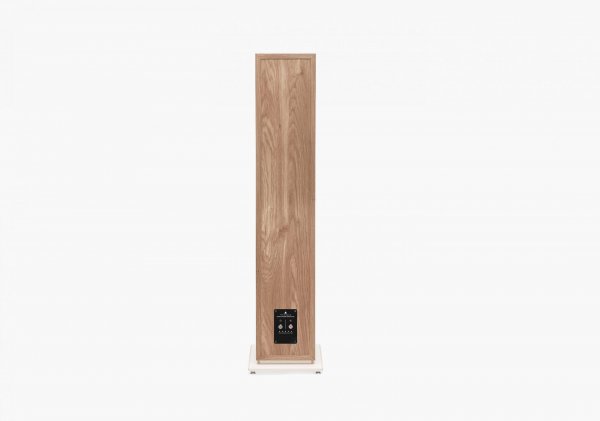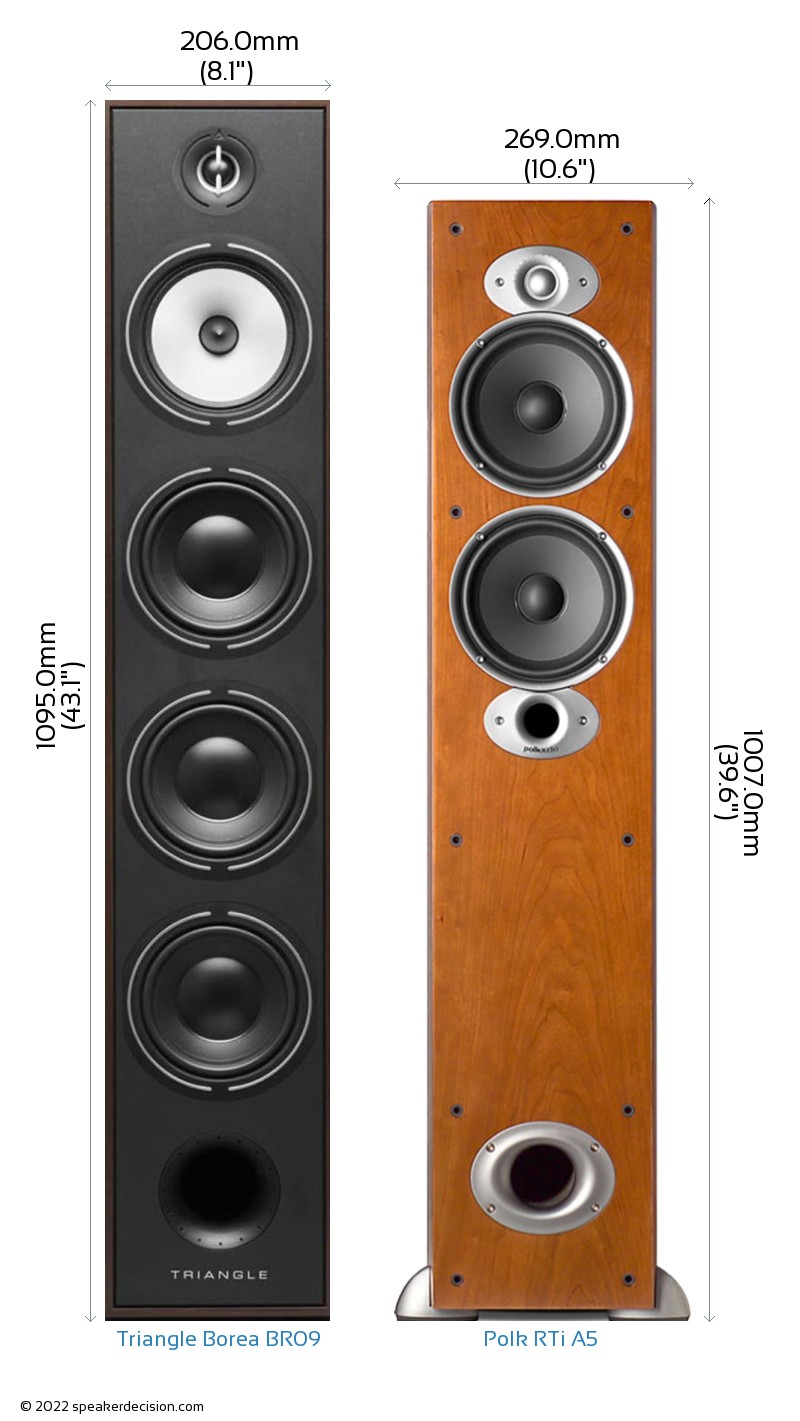In this review, we will be comparing Borea BR09 and RTi A5, two Passive Floor-standing speakers from Triangle and Polk Audio. Let's have a brief look at the main features
of Triangle Borea BR09 and Polk RTi A5 first before getting into our more
detailed comparison.
What size room are the Triangle Borea BR09 and Polk RTi A5 speakers good for?
The size of the room in which you are planning to use these loudspeakers is an important decision factor. Here we have compared their suitability to various sizes of environments considering their size and max power parameters:
In the following sections, we will get into more detail in order to better understand how the Triangle Borea BR09 and Polk RTi A5 compare and hopefully end up with enough arguments to decide which one of these loudspeakers is the better choice for you.
**This post contains affiliate links, and I will be compensated if you make a purchase after clicking
through my links. As an Amazon Associate I earn from qualifying purchases.
Drivers
One of the fundamental differences between these two speakers is that Borea BR09 is a 3-way design whereas the RTi A5 is a 2-way speaker. 3-way designs utilize a midrange driver in addition to the tweeter and woofer on 2-way designs. Designing a crossover for a 3-way speaker is a complicated process and generally increases the overall cost of the speaker.
| Driver |
Triangle Borea BR09 |
Polk RTi A5 |
|
Driver Setup
|
3-way
|
2-way
|
|
Tweeter
|
1-inch
|
1-inch
|
|
Midrange
|
1 x 6-inch |
- |
|
Woofer
|
3 x 6-inch
|
2 x 6.5-inch
|
Borea BR09 features a 1" silk dome Tweeter , a 6" Midrange and 3 x 6" fiberglass Woofer with a Crossover frequency at 310Hz and 3900Hz. On the other hand, the RTi A5 features a 1" Tweeter and 2 x 6.5" Polymer composite Woofer .
Frequency Response
Borea BR09 has a frequency range of 35 - 22k Hz whereas RTi A5 has a frequency range of 40-26k Hz. With a minimum frequency of 35Hz, the Borea BR09 can go significantly deeper on the low side and provide stronger bass compared to the RTi A5's min frequency of 40Hz.
Below graphs depict how these two speakers compare with the max, min and average values of the Min and Max Frequencies of other speakers in the Floor-standing class in our database.
Low Frequency
Floor-standing Speakers
High Frequency
Floor-standing Speakers
None of these speakers achieves full range experience which is commonly agreed as 20Hz-20kHz. In order to achieve lower lows / deeper bass, we recommend you pair these with a subwoofer. Visit our Powered Subwoofers section to find out more about the available options.
Impedance and Sensitivity
Borea BR09 and RTi A5 have the same Impedance of 8 ohms but where they differ is the sensitivity levels. Borea BR09 sensitivity is rated at 92.5 dB and the RTi A5's is at 90 dB. This 3 dB difference makes the Triangle Borea BR09 a more sensitive speaker compared to Polk RTi A5, hence will play louder with the same amount of watts.
Sensitivity
Floor-standing Speakers
Power Range
Power
range is the range of input power in watts RMS that a loudspeaker is designed to handle. While using an amplifier within this range ensures the nominal performance , inputting a power that is higher than the max wattage can result in a damaged speaker.
Borea BR09 can handle a max power of 250 watts RMS from the amp the whereas Borea BR09 has a max power handling value of 170 watts RMS , 80 watts less than the RTi A5.
Keep in mind that a higher max power handling value doesn't necessarily make that a louder speaker
compared to a lower max handling speaker. Loudness or the sound level is also impacted by parameters
such as Impedance, sensitivity and system efficiencies.
Input Type and Bi-Amping / Bi-Wiring
RTi A5 features 5-way post posts which make bi-amping or bi-wiring possible. Borea BR09 has a Binding post which doesn't feature bi-amping/bi-wiring.
 Triangle Borea BR09's Binding post terminals
Triangle Borea BR09's Binding post terminals
Cabinet Type and Port Position
Both Borea BR09 and RTi A5 have front firing ports. front ported speakers offers more flexibility in placement in regards to proximity to walls&surfaces compared to rear ported speakers.
Physical Specs
Size of a speaker can sometimes become an important decision factor due to space constraints or in some cases purely for esthetic reasons. In this section, we are going to compare Triangle Borea BR09's and Polk RTi A5's external dimensions. Triangle Borea BR09 has external dimensions of 1095.0 x 206.0 x 314.0mm ( 43.1 x 8.1 x 12.3inch) whereas Polk RTi A5 has external dimensions of 1007.0 x 269.0 x 404.0mm ( 39-5/8 x 10-9/16 x 15-7/8inch) .
Triangle Borea BR09 is 63mm narrower and 90mm less deeper than Polk RTi A5 but it is also 88mm taller.
Below you can see the front view size comparison of Triangle Borea BR09 and Polk RTi A5 in scale.
 Comparison image of Triangle Borea BR09 and Polk RTi A5 Size and External Dimensions
Comparison image of Triangle Borea BR09 and Polk RTi A5 Size and External Dimensions
Base Surface Area Comparison
Base surface area of a loudspeaker may become a determining factor when the space in your room or desk is limited.
The base surface area of the Triangle Borea BR09 is approximately 646.8cm2 / 100.3inch2 and base area of the Polk RTi A5 is approximately 1086.8cm2 / 168.5inch2. The Borea BR09 requires 40% less surface area than the RTi A5 which gives it a small advantage on placement in tight spaces.
Weight Comparison The weight of a loudspeaker can become an important factor if you need to move and reposition the unit often. Weight of a speaker can also "sometimes" be an indicator of the rigidity of the enclosure and the quality of the internal components used. The Triangle Borea BR09 weighs 21.80kg / 48lbs and the Polk RTi A5 weighs 18.18kg / 40lbs. This makes the Borea BR09 20% heavier than the RTi A5.
Here is a comparison of how Borea BR09 and RTi A5's weights compare with the average, max and min weights in Passive Floor-standing class.
Weight
All Floor-standing Speakers
What's in the Box of Triangle Borea BR09?
Here are the items that are included inside the box of Borea BR09:
2 x Borea speakers 2 x protections grids 2 x pedestals 8 x screws 8 x adhesive rubber plots 8 x decoupling spikes 1 x user manual
What's in the Box of Polk RTi A5?
Here are the items that come with the RTi A5:
Cherry floor-standing speakerDetachable black cloth grille4 Screw-on spike feetOwners ManualOnline registration sheetPolk Audio product brochure
 Driver Setup Driver Setup |
3-way
vs
2-way
|
Have a dedicated mid-range driver |
 Sensitivity Sensitivity |
93 dB
vs
90 dB
|
Play louder with same amount of amplification power |
 Number of Woofers Number of Woofers |
3
vs
2
|
More woofers |
 Low Frequency Response Low Frequency Response |
35 Hz
vs
40 Hz
|
Generates deeper bass |
 Base Surface Area Base Surface Area |
646cm2 (206x314mm)
vs
1086cm2 (269x404mm)
|
Takes less floor space |
 Max Input Power Max Input Power |
250 watts
vs
170 watts
|
Handle more power from your amplifier |
 Woofer Size Woofer Size |
6.5 inches
vs
6 inches
|
Larger woofer |
 High Frequency Response High Frequency Response |
26k Hz
vs
22k Hz
|
Generates higher frequency |
 Bi-Amping and Bi-Wiring Bi-Amping and Bi-Wiring |
Yes
vs
No
|
Allows bi-amping and bi-wiring connections |
 Height Height |
1007mm
vs
1095mm
|
Easier to fit in smaller spaces |
| General |
Triangle Borea BR09 |
Polk Audio RTi A5 |
| Brand |
Triangle |
Polk Audio |
| Speaker Type |
Floor-standing speaker |
Floor-standing speaker |
| Power Range |
up to 170 watts |
20-250 watts |
| Sensitivity |
92.5 dB |
90 dB |
| Impedance |
8 ohms |
8 ohms |
| Impedance |
3.3 ohms |
n/a |
| Frequency Response |
35 - 22k Hz |
40-26k Hz |
Drivers |
|
|
| Woofer Quantity |
3 |
2 |
| Woofer Size |
6" |
6.5" |
| Woofer Composition |
fiberglass |
Polymer composite |
| Woofer Surround Material |
n/a |
Butyl Rubber |
| Tweeter Size |
1" |
1" |
| Tweeter Type |
dome |
n/a |
| Aimable Tweeter |
No |
No |
| Midrange Driver |
6" |
No |
| Crossover Frequency |
310Hz and 3900Hz |
n/a |
| Firing Direction |
front |
front |
Physical Specs |
|
|
| Height |
1095.0mm (43.1") |
1007.0mm (39.6") |
| Width |
206.0mm (8.1") |
269.0mm (10.6") |
| Depth |
314.0mm (12.4") |
404.0mm (15.9") |
| Weight |
21.80kg (48lbs) |
18.18kg (40lbs) |
| Enclosure |
Bass Reflex |
Bass Reflex |
| Finish |
n/a |
Real wood veneer |
| Available Colors |
Light Oak, Walnut, Black, White |
Cherry |
| Grille |
Yes |
Yes |
| Moisture Resistancy |
No |
No |
Connections |
|
|
| Biamp Inputs |
No |
Yes |
Other |
|
|
| Parts Warranty |
5 Years |
5 Years |
| Labor Warranty |
5 Years |
5 Years |